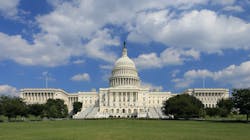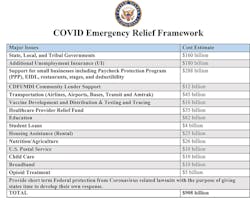Bipartisan $908 billion emergency relief framework includes funding for transportation
A bipartisan group of members of Congress unveiled the framework for a $908-billion emergency relief proposal designed to carry the U.S. through the next quarter.
The text of the bill is still being finalized, but the proposal will include financial relief for states, local and tribal governments, students, the unemployed and transportation, among others.
“Millions of Americans have been impacted by the COVID-19 pandemic and are hurting, but Congress has been deadlocked for months with both sides unwilling to compromise to help our fellow Americans who are in desperate need,” U.S. Sen. Joe Manchin (D-WV) said. “The bipartisan, bicameral framework announced today proves that we can reach across the aisle and create meaningful compromise that will help those who need it most for the next few months.”
In addition to Sen. Manchin, the group who worked on the proposal includes Sens. Susan Collins (R-ME), Mark Warner (D-VA), Bill Cassidy (R-LA), Jeanne Shaheen (D-NH), Lisa Murkowski (R-AK), Angus King (I-ME), Mitt Romney (R-UT) and Maggie Hassan (D-NH), as well as members of the U.S. House’s Problem Solvers Caucus including U.S. Reps. Josh Gottheimer (D-NJ-5), Tom Reed (R-NY-23), Anthony Gonzalez (R-OH-16), Dusty Johnson (R-SD), Dean Phillips (D-MN-3), Abigail Spanberger (D-VA-7) and Fred Upton (R-MI-6).
Sen. Romney, a self-described deficit hawk, explained the framework is not a trillion-dollar stimulus bill, but a relief measure that uses $560 billion in repurposed funds from the first CARES Act.
What can transportation expect?
According to Sen. Warner’s office, the $45 billion for transportation would include $15 billion for mass transit, $1 billion for Amtrak and $8 billion for buses/motorcoach industry. Additionally, how the mass transit funds would be distributed has not been finalized.
The transit industry has been requesting at least $32 billion in emergency relief as the combined impacts of the pandemic have left systems across the U.S. struggling to find balance financially.
The New York Metropolitan Transportation Authority is considering a budget proposal that would include more than 9,300 layoffs and service reductions of between 40 and 50 percent. The Chicago Transit Authority if facing a $375-million shortfall in 2021 and passed a budget contingent on additional federal support. Denver’s Regional Transportation District (RTD) passed a budget in mid-November that included $140 million in spending cuts from the elimination of 400 positions through both layoffs and not filling open positions. Wage reductions and furloughs were also included in RTD’s budget cuts.
In the nation’s capital, the Washington Metropolitan Area Transit Authority (WMATA) has proposed a FY2022 budget that “preserves barebones service,” but may eliminate up to 2,400 jobs, reduce bus service, close 19 rail stations and eliminate weekend rail service.
Sen. Warner noted, if enacted, the changes to WMATA service would “have a dramatic effect on the functions of the federal government, as well as for constituents across the tristate area.”
“While not a full solution to the challenges presented by the COVID-19 crisis, the bipartisan agreement we’ve reached today will help Americans weather this winter and get through the holiday season, while providing urgent relief for small businesses, local governments, health care providers and low-income and minority communities, among others,” said Sen. Warner.
What to expect moving forward
Answering reporters’ questions during a press conference about the framework, Sen. Manchin noted the bicameral group would be “working diligently” to finalize a bill “as quickly as possible.”
The framework is retroactive to Dec. 1 and extends to March 31, which gives Congress a few weeks to nail down details on the proposed legislation and potentially pass a piece of legislation.
The group shared that House and Senate leaders had been made aware of their proposal, as had the White House. Sen. Romney explained Sec. of the Treasury Steve Mnuchin had provided guidance on funding levels included in the framework, but did not indicate whether the White House was in support of the proposal.
Senate Majority Leader Mitch McConnell (R-KY) said the following on the Senate floor Nov. 30, “There is no reason why we should not deliver another major pandemic relief package to help the American people through what seems poised to be the last chapters of this battle.”
House Speaker Nancy Pelosi (D-CA) said “additional COVID relief is long overdue” and noted that in phone call with Sec. Mnuchin, the bipartisan proposal would be reviewed.
Ultimately, pressure to deliver a new relief package could come from constituents. A survey conducted on behalf of the American Public Transportation Association in early November found that 77 percent of respondents supported emergency funding for public transportation and 71 percent said public transportation keeps communities working and is essential to keep society functioning.
About the Author

Mischa Wanek-Libman
Group Editorial Director
Mischa Wanek-Libman is director of communications with Transdev North America. She has more than 20 years of experience working in the transportation industry covering construction projects, engineering challenges, transit and rail operations and best practices.
Wanek-Libman has held top editorial positions at freight rail and public transportation business-to-business publications including as editor-in-chief and editorial director of Mass Transit from 2018-2024. She has been recognized for editorial excellence through her individual work, as well as for collaborative content.
She is an active member of the American Public Transportation Association's Marketing and Communications Committee and served 14 years as a Board Observer on the National Railroad Construction and Maintenance Association (NRC) Board of Directors.
She is a graduate of Drake University in Des Moines, Iowa, where she earned a Bachelor of Arts degree in Journalism and Mass Communication.

